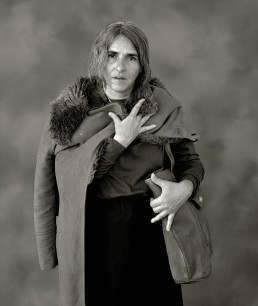S3: Fine Line - Episode 7 - Doris

Episode Information
Fine Line: Mental Health/Mental Illness – Episode 7 – Doris
[Intro Music]
Narrator: Welcome to Season three Fine Line narrative histories about mental health and mental illness, a traveling exhibition and weekly podcast edited and hosted by Michael Nye, supported by Kronkosky Charitable Foundation. May you find insight and understanding in these voices. Episode seven, Doris.
Doris: My name is Doris. I’m 43. I’ve got a bachelor’s degree in sociology and I’ve been diagnosed with what used to be called multiple personality disorder, what is now referred to as dissociative identity disorder or DID if. And it’s kind of a dream. If I ever get lucky to win the lotto. And I try, I buy a house of my own. It’s my home. And no one can take it away from me because I’d feel safe. That was mine. And do nice normal things. Maybe have a dog or cat or two running around and had that freedom to be myself
As a child. Growing up, I didn’t know if I was gonna be alive the next year or not. I can remember there was physical violence. Father who’d molested me. Mother was physically violent. I’ve got scars on my hand from my mother, stuck in my finger in a fan being pushed down flights of stairs. And there was something so horrible that happened. I became so deathly afraid of going into somebody else’s house to a point where I would just sit frozen, afraid to move. And I guess started fragmenting and fragmenting. ’cause there’s so many incidents. It’s like a fear of drowning and nobody stepped in. My multiple personalities came from a need to protect myself against the shock of the traumatic occurrences I had growing up. And especially if it’s a dangerous situation, it’s a total blackout. And all I’ve got is a scary feeling leftover. They started doing that to protect my mind because at a young age, I probably would’ve died from the shock I’m alive because I’ve got my personalities. But it’s dysfunctional. In adult years, I’ve lived on the street as a homeless individual for a couple of years, trying to go from shelter to shelter. There’s once in 85, I was in Dallas. I was wandering around the streets and it was like early in the evening. The next thing I know, I’m halfway between Dallas and Texarkana. There’s a car driving away. I dunno how the hell I got there. I’m scared to death. I can’t explain why I, and it’s a lot later at night to not know how the hell I got there. And when I start remembering their nightmares,
The public looks at individuals with mental illness like we’re not even human. When I look at people who talk about that, they use terms like lunatic. They talk about you in the third person. Like you’re not even in the room. They think we’re all dangerous and they don’t wanna be seen in our company. They’re afraid to come near us. Little kids and animals see something in me that is good little kids will come up to me. And you can’t really lie to a small child about that ’cause they haven’t learned to see that lie yet. Had more dogs and cats come up to me trying to sway me into letting them in my home and birds too. And getting a couple of geese at the zoo to look at me and stare. Well, I take their picture <laugh>. Not everybody can do that. <laugh>, one thing that helped me survive all these years and to keep going was the conversation I had with the Orthodox Rabbi here in San Antonio. And he said, well, if you get well, I convert you. He gave me the courage and the hope and just something to grasp for. And when I became Jewish, uh, my heart and everything about me was already there. I wasn’t gonna let anybody take that away from me because that meant no matter where I go, they have to accept me as a part of the community.
[Outro Music]
Host: Doris has experienced discrimination. She said The public looks at individuals with mental illness like we’re not even human. They think we’re all dangerous. They don’t want to be seen in our company. They’re afraid to come near us. Discrimination is so painful wrong. It’s cruel. It impacts one’s identity. Doris told me, I tell myself so often, Doris, don’t ever wish your life away. Hang on. It will get better to understand another person. You must consider things from his or her point of view. Thank you, Doris, for your voice, for your strength, in your presence. May something Doris’s story stay with you. I’m Michael Nye. You can go to my website, michaelnye.org/podcast for Doris’s portrait and transcript. Thank you for listening
